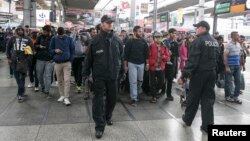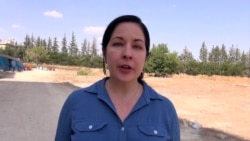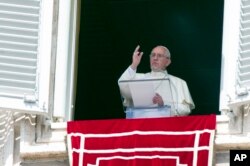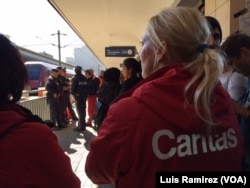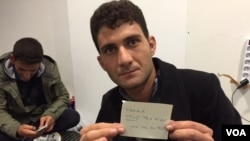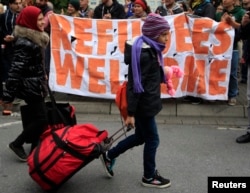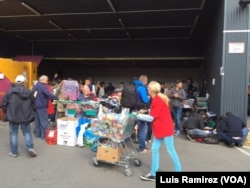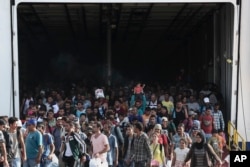Germany and Austria are welcoming thousands of migrants within their borders Sunday.
Most of the migrants have opted to seek refuge in Germany -- Europe's wealthiest country -- where an estimated 8,000 are expected to arrive by day's end. German officials have said they will accept as many as 800,000 asylum seekers this year.
European Union countries have been divided amid an unprecedented migrant influx.
EU foreign affairs chief Federica Mogherini has warned that the migrant inflow is “here to stay” and called for a unifying European approach to effectively respond to it.
WATCH: VOA's Heather Murdock reports from the Turkish border
"It is here to stay, and the sooner we accept it, accept it psychologically and politically, the sooner we will be able to respond in an effective way, and to manage in an effective way," Mogherini said Saturday after a meeting of EU foreign ministers in Luxembourg.
Also Sunday, Pope Francis called on every European parish and religious community to take in one migrant family each in a gesture of solidarity, saying he said would start in the tiny Vatican state where he lives.
"I appeal to the parishes, the religious communities, the monasteries and sanctuaries of all Europe to ... take in one family of refugees," he said after his Sunday address in the Vatican. "Every parish, every religious community, every monastery, every sanctuary of Europe, take in one family."
The pope's call goes out to tens of thousands of Catholic parishes in Europe. There are more than 25,000 parishes in Italy alone, and more than 12,000 in Germany.
Meanwhile, refugees on Turkey's border with Syria told VOA Sunday that more and more newcomers are going directly from the borders to buses to begin the next phase of their dangerous journey toward Europe.
Also Sunday, Australia Prime Minister Tony Abbott said his country will accept more refugees from camps bordering Syria and Iraq and "is open" to providing more financial assistance, while adding that a "strong security response" was needed for the region.
The Australian government is due to make a decision within the week on whether to join airstrikes against Islamic State fighters in Syria, having been part of the operation in Iraq since last year.
Immigration Minister Peter Dutton will travel to Geneva to meet with António Guterres, the U.N. High Commissioner for Refugees, to ask what further assistance Australia could provide, Abbott told reporters in Canberra.
WATCH: Refugees arrive in Vienna, Austria
Austrian Foreign Minister Sebastian Kurz said that the migrants’ plight and the growing human cost is a “wake-up call” for Europe to resolve its biggest refugee crisis since World War Two.
The migrants are fleeing war and poverty from locations including Syria, Afghanistan, Iraq, Eritrea and Somalia.
The first trains carrying thousands of refugees left Austria for Germany just hours after they were bused from Budapest to the Austrian border.
Meanwhile, authorities in Cyprus rescued more than 100 people Sunday from the Mediterranean, including men, women and children, who are believed to be Syrian refugees, after their vessel ran into trouble. Police said it is not clear whether the group was headed for Cyprus or to the European mainland.
Back in Budapest, migrants continued to arrive on their journey to the wealthier western European countries.
Hungarian officials have consistently placed obstacles in the migrants' trek to western Europe. The migrants are not interested in settling in Hungary, yet Hungary seems set on doing all it can to prohibit them from reaching their destinations in other parts of Europe.
Hungary had refused to let the refugees board westward trains, in an effort to comply with European Union regulations that require they be registered in the first EU country they get to. But the refugees refused to go to processing centers, hoping to move on and register somewhere else where the economy is stronger.
Hungary has built a 174-kilometer fence of razor wire along its border with Serbia in an effort to keep the mostly Muslim migrants from entering Hungary.
Elsewhere, Iranian President Hassan Rouhani praised European Union countries that are helping the refugees streaming into the 28-nation bloc and urged others to step up their efforts.
The remarks, which were published on Rouhani's website Sunday, came during a meeting with the new Hungarian ambassador in Tehran and were seen as indirect criticism of Budapest's handling of the situation.
In Israel, Prime Minister Benjamin Netanyau said his country is not indifferent to the plight of migrants and refugees flooding Europe, but that Israel is too vulnerable to absorb them.
Netanyahu bemoaned the "human tragedy" of the victims of Syria's civil war and said Israel has aided them in various ways. But he added that Israel is too small a country, both geographically and demographically, to provide a haven for a large influx of migrants.
On the Greek island of Lesbos, police have used batons to beat back a demonstration by some 300 migrants chanting "Athena, Athena" as they tried to come out of the port area. Several of the protesters were injured in the clash, with one taken away unconscious by an ambulance.
The migrants, mostly Syrians, Iraqis and Afghans, say that local authorities on the Aegean island are not processing them quickly enough so they can continue their journey to western Europe. The demonstration on Sunday was led by Afghans.
Luis Ramirez contributed to this story from Vienna, Austria. Some material for this report came from Reuters and AP.




